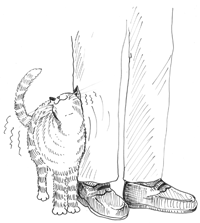STRANGE BUT TRUE- Purring cat: The noise depends on the household

DRAWING BY DEBORAH DERR McCLINTOCK
Q. What's most "im-purr-fect" about the colorful old
saying, "It's the cat's meow"? –J. Fariello
A. Ironically, a meowing cat may sound anything but "cool" or "great" or "neat" to a tired owner as she kicks her feline friend out of the early morning bedroom, reports the journal Current Biology.
Far more acceptable to humans and effective for the hungry cat is purring, especially "solicitation purring," says University of Sussex researcher Karen McComb. In one test, humans rated these purrs as "more urgent and less pleasant" than regular purring, as they embed a high-frequency "cry" like an infant's wail that exploits the human tendency to nurture, tugging us toward the can-opener.
Not all cats, however, are in on the ruse. It seems to develop most often in those with a strong one-on-one with their owners rather than in large households where such purring can get overlooked, McComb adds. Meowing is more likely in these households or when strangers are present.
Q. There's a riddle was about a farmer selling eggs: The first customer asked for "half of what you have in your basket, plus half an egg." The farmer obliged without breaking any eggs. The second customer made the same request, and again the farmer complied, without breaking any eggs. After complying with a third customer's identical request, the farmer declared, "Now I have no eggs left in my basket." Can you figure how many eggs the farmer had to start with? –D. Aller
A. This is one of those quirky problems best worked by trial and error. First observe that there must have originally been an odd number of eggs in the basket, since half of an odd number leaves a remainder of one-half egg, allowing the final removal of another half egg to make it a whole number. This way there would be no broken eggs. (Key idea: It's a whole lot easier dividing a mathematical egg in half instead of a real egg.)
So let's guess the farmer started with seven eggs. Then he would have given the first customer 3.5 eggs (half of what he had in his basket), plus .5 egg (half an egg), meaning he would have handed over 4 eggs, with 3 left over. Next the farmer would have given the second customer 1.5 eggs + .5 egg = 2 eggs, leaving only a single egg. Finally, the third customer would have received half of this single egg + half an egg = 1 egg, which would have emptied the farmer's basket, as stipulated. Eggs-actly right!
Q. With human technology what it is today, why can't we just filter the salt from the oceans and make potable water for arid parts of the world? –B. Mooney
A. We're indeed doing this, via "desalination" using flash-distillation (picture a kettle boiling the water and the steam then condensed into water) as in Saudi Arabia with much cheap oil for energy, or via reverse osmosis using a membrane to filter out the salt, says University of California-Berkeley environmental engineer John Dracup.
Three problems with desalination: 1. Due to the energy requirements, it is an expensive process; 2. Ocean desalination occurs at sea level whereas most water supplies occur in the mountains or at a higher elevation and flow by gravity down to the customers. "Therefore, you have to pump the water up to where you want it, again expensive," Dracup says; 3. The residual brine is categorized as a pollutant and difficult to get rid of. "You can't just dump it back into the ocean."
So, yes, "water, water everywhere" but not quite ready to drink.~
Send Strange questions to brothers Bill and Rich at [email protected].
#